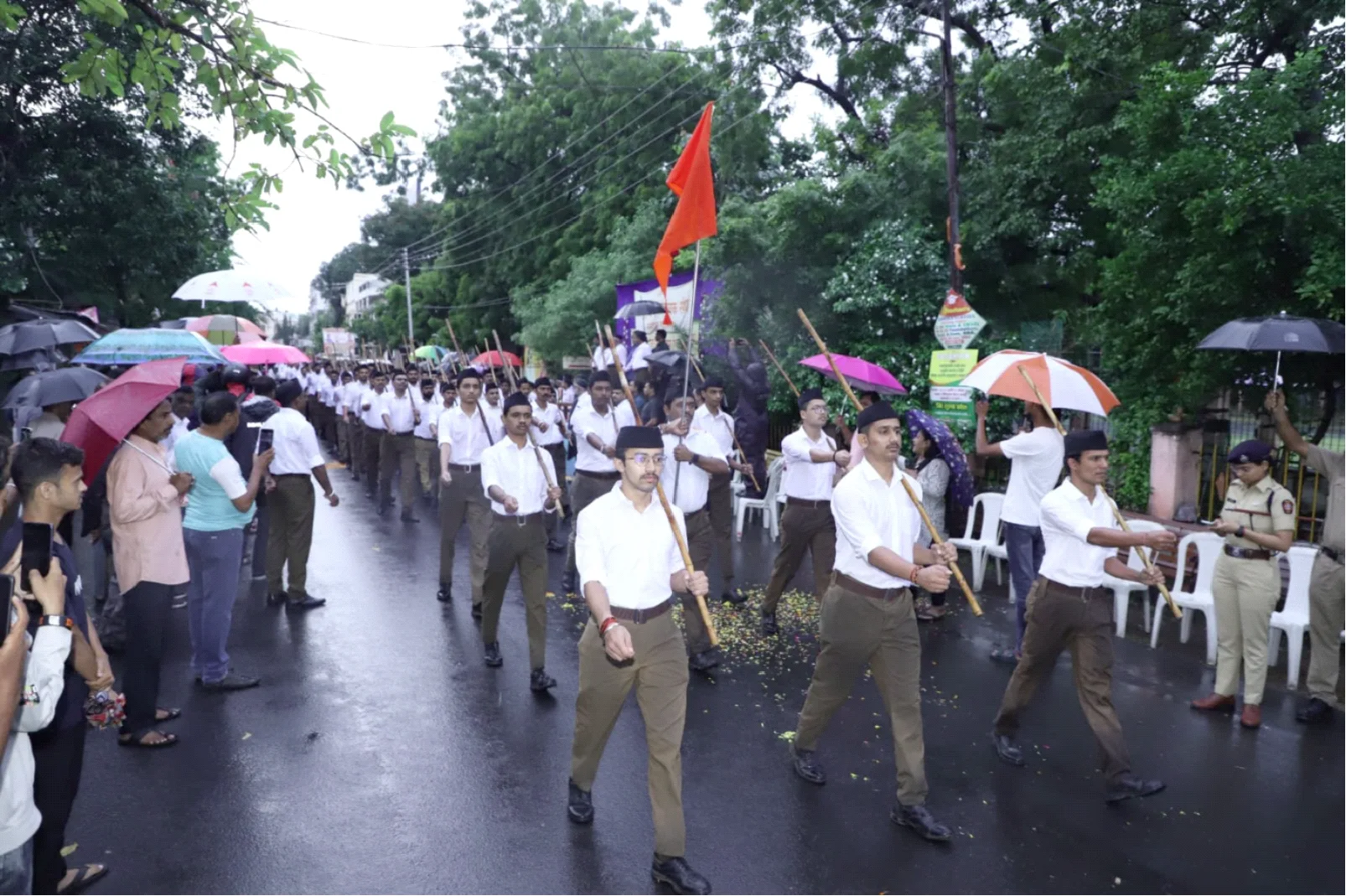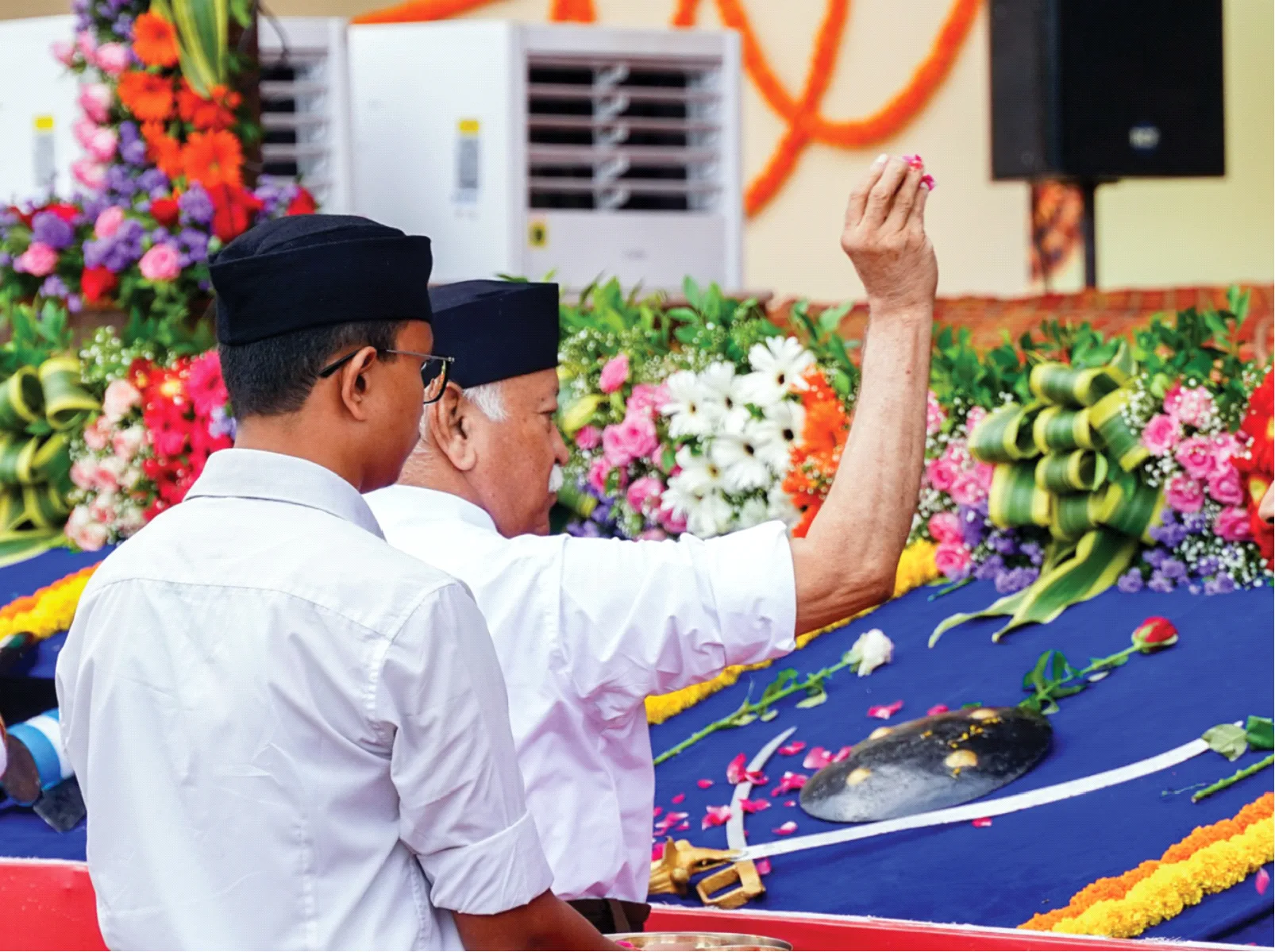The importance of a strong virtuous being is the core message of the Vijayadashami. “The world worships the strong. To establish an environment of harmony and restraint, good people will have to be strong,” said RSS Sarsanghchalak Dr Mohan Bhagwat in his Vijayadashami speech. “The RSS entering its centenary this year exemplifies the success story of a great dharmic force of the world or the victory of the virtuous,” he added.
Society is always led by great personalities who serve as role models for the entire population. We celebrate their birth anniversaries to remind ourselves of their contribution, and also make the present generation aware of those. In this context, the Sarsanghchalak mentioned the 500th birth anniversary of Maharani Durgavati, the 300th birth anniversary of Punyashlok Devi Ahilya Bai Holkar, the 200th birth anniversary of Maharshi Dayanand Saraswati, the 150th birth anniversary of Bhagwan Birsa Munda and the 100th year of the ‘Satsang’ of Shri Anukulchandra Thakur of Bengal.

Nagpur, Maharashtra
Said Dr Bhagwat, “We remember such heroic personalities who devoted their lives for the welfare of Bharat, dharma, sanskriti and society with utmost honesty and selflessness as they have not just worked for our welfare, but also presented a model of exemplary conduct for us through their lives.” He asserted their relevance in the current context, stating, “Whether the situation is favourable or unfavourable, such firmness of personal and national character becomes the foundation of strength for the victory of auspiciousness and righteousness.”
“Our nation has become stronger and more respected in the comity of nations in the past few years because of the efforts of all. Our traditional ideas like vasudhaiva kutumbakam, universal brotherhood, our views on the environment, yoga and others have gained much respect globally. This has instilled self-pride in society, especially among the youth,” he stated. Dr Bhagwat specifically mentioned that all elections, including Jammu and Kashmir, were conducted peacefully. “However, we must be cautious about the cultural contaminations that may affect our society from outside,” he remarked.
Stating that conflicts of selfish interests may push us to destruction, as seen in the West Asian conflict, he cautioned people against the sinister conspiracies and attempts to disturb and destabilise India by those who are annoyed by our country’s rise.
Talking about the brutal atrocities upon Hindu minorities by fundamentalists in Bangladesh during the violent coup, he emphasised that things improved only after the Hindu society got together and came out of their homes to defend themselves. “The Hindu community across the world should learn a lesson; being unorganised and weak is an open invitation to atrocities by the wicked,” he said.
Dr Bhagwat talked about ‘Deep State’, wokeism’, and ‘cultural marxism’, the terms that are in vogue these days, and that aim to destroy traditions and values while intensifying distrust and hatred towards the system, law, governance and administration at the same time, by influencing the education system, educational institutions, media, and the intellectual discourses, etc. “They also propagate their agenda of ‘alternate politics’ thereby endangering stability, peace and prosperity of a nation, as was seen in the ‘Arab Spring’ and the coup in Bangladesh. Similar attempts were made in our border and tribal areas, as well,” he said, adding that the only solution to thwart such attempts is an awakened society. “Only awakened and alert people can put a stop to these designs,” he said, “for which a constitutionally acceptable and democratically sound plan is required. Then alone can the spread of intellectual and cultural pollution be stopped.”
To tide over environmental issues, Dr Bhagwat called for a sustainable, holistic and integrated vision based on the Bharatiya tradition, and not on consumerism and materialism
He raised concern about the increasing erosion of values among the younger generation, thanks to the distorted propaganda and poor values being spread through various systems, institutions, advertisements, mobile phones and perverted visual content apart from menaces like drug addiction.
“In a country that believes in Maatrivat Paradaareshu (other’s wife is like a mother), women are facing shameful incidents of rape in many places, like Kolkata’s RG Kar Hospital,” he remarked, adding, “even as the society stood with the protesting doctors, a nexus of crime, politics and toxic culture tried to protect the culprits.” He then stressed on the importance of instilling traditional values through family, society and media.
Cautioning against the attempts to create conflicts by dividing society on the basis of caste, language, province etc, the Sarsanghchalak cited regions which fell prey to such nefarious attempts: “States of Punjab, Jammu-Kashmir, Ladakh on the north-western border of the country; Kerala and Tamil Nadu down south; and the entire Purvanchal from Bihar to Manipur are facing these disturbances…. There is a sudden increase in the incidents in the country that incite fanaticism without any reason. Though the administration is there to act against such divisive forces, the society has to protect itself by remaining fully alert,” he said. Exhorting all caste groups to work together so as to uplift weaker sections and strengthen the society, he said that to nurture social harmony and goodwill, the participation of all the sections of the society is a must. “Everyone should be free to visit temples, use drinking water and crematoriums as and when required. Every section must support weaker members of the society,” he said.
To tide over environmental issues, Dr Bhagwat called for a sustainable, holistic and integrated vision based on the Bharatiya tradition, and not on consumerism and materialism. “Everyone must follow three practices: Use water minimally and conserve rain water; Shun plastic items, especially single-use plastic and increase greenery in homes by planting trees, participating in afforestation and preserving already planted trees,” he advocated.
“The education system must reflect our traditional values and popular personalities should conduct themselves with care and reflect good values as thousands of girls and boys of impressionable age follow them, and look up to them. The National Education Policy aims to impart value education, and a new system of teacher-orientation is required for that,” said Dr Bhagwat adding that even social media should work towards uniting the society and impart good values instead of spreading obscenity and hate.

Emphasising the importance of family in imparting cultural values, he said, “Parents and other elders must behave well at home, as children follow what they see. The atmosphere at the home should be congenial, and lots of friendly conversations must take place at home.”
He highlighted the significance of civic discipline and social behaviour like respecting the law and Constitution, obeying traffic rules, paying taxes, clean and transparent financial transactions etc. “Both personal and national characters are important,” he said, adding that self-esteem, self-reliance and swadeshi behaviour in language, attire, worship, and food are essential for progress. “Do not import from outside what can be made at home and manage without what is not made in the country,” he added,

Dr Bhagwat also stressed on the importance of restrained behaviour. “We should not react to everything that happens in social life. In our response, we should avoid unrestrained behaviour because tolerance and harmony are Bharatiya traditions,” he said, adding “One should be alert in one’s own conduct as well. Our thoughts, words or deeds should not insult anyone’s faith, revered places, great personalities, books, incarnations, saints etc. Even if, unfortunately, someone else does something like this, we should control ourselves,” he said.
Concluding his speech by inviting everyone to join the Sangh, Dr Bhagwat said, “We pray for possessing an invincible strength and flawless character in our daily prayers. The more Bharat’s power increases, the more Bharat will be accepted across the globe. Sangha is silently engaged in daily sadhana, though the Sangh Sakhas.”



















Comments